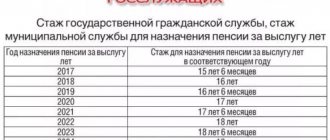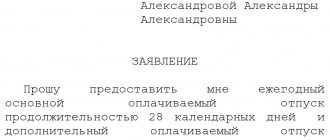Since January 2021, changes have already come into force, clarifying the procedure for granting leave to civil servants. And from August 2, other innovations are in effect that relate to the duration of all types of paid leave for civil servants (basic annual leave, leave for long service, as well as leave for irregular working hours). The legal gap will be eliminated in terms of establishing the maximum duration of the last type of leave (previously, the absence of such a norm led to strong differentiation of the conditions for performing civil service in various government bodies). In the article we will tell you in what order leave is and will be provided to civil servants, taking into account changes.
Types and duration of vacations at present
According to Art.
46 of the Federal Law of July 27, 2004 No. 79-FZ “On the State Civil Service of the Russian Federation” (hereinafter referred to as Law No. 79-FZ), the employee is granted annual leave while maintaining the civil service position being filled and salary. Such leave consists of basic paid leave and additional paid leave. Now the duration of the annual basic paid leave in accordance with paragraphs 3 and 4 of Art. 46 of Law No. 79-FZ is:
- for employees holding senior and main positions in the civil service - 35 calendar days;
- for employees filling civil service positions of other groups - 30 calendar days.
We will present additional holidays in the form of a diagram.
| Additional holidays | ||||||
| For length of service at the rate of 1 calendar day per year (clause 5 of article 46 of Law No. 79-FZ) | For irregular working hours - at least 3 calendar days per year (Part 4, Article 45 of Law No. 79-FZ) | For work in harmful and (or) dangerous service conditions for at least 7 calendar days (Clause 7, Article 46 of Law No. 79-FZ) | For work in the regions of the Far North - 24 calendar days, in equivalent areas - 16 days (Clause 7, Article 46 of Law No. 79-FZ) | |||
Changes in the Federal Law
Since the beginning of 2021, the law has changed significantly.
Now higher requirements are being put forward for the qualification level of employees (both municipal and state).
Applicants for a high position: manager, adviser, specialist (higher/main group) must have a higher education (starting from a master's degree).
The changes do not apply to persons enrolled in the state. service before their entry into force. Also, this point does not apply to citizens who received their education before August 29, 1996.
Qualification requirements must be comparable to the position. All employees are required to have proper professional training and knowledge that will allow them to perform their job duties efficiently.
Some specialists are given preference due to their special training - they are initially trained as employees suitable for a specific position in the government. organ
The law duplicates the usual labor standard - the minimum period of vacation paid by the employer is 28 days (calendar).
The minimum period of stay on vacation is two weeks. The vacation is postponed to the next year at the request of the employee and after he has written a corresponding application.
The new version of the law has undergone the following changes (modifications):
Art. 7
The phrase “...for civil service positions and municipal service positions” previously used in paragraph 1 of the article has been adjusted. Now this paragraph contains the following phrase: “... to fill civil service positions and municipal service positions.”
Art. 12
The essence of the amendments to the article is as follows.
Important! To occupy a position in the government. authorities require appropriate education, level and direction of training, and work experience. Taking into account the category of the position, specific conditions are put forward for the qualifications of the replacement specialist.
Art. 16
This article has been supplemented with paragraph 12 (regarding part 1). Based on the changes, information that is required to be submitted under Art. 20.2 may not be indicated.
Art. 17
In accordance with part 1.1 of the article for the state. employee, his wife (husband), as well as minor children, a ban is introduced on opening and maintaining accounts (deposits) in banks outside Russia.
Art. 20
The changes also affected the third chapter of the law.
Note! It says that every employee has the opportunity to use the Internet to transmit personal information for the purpose of further identification.
This opportunity can be used by:
- Citizens who want to get a job in the government. organ. They should provide personal information about themselves for the period of three years preceding the moment of employment,
- An employee can provide such information once a year. Circumstances when such actions are performed to perform functional duties may be considered as an exception.
In accordance with the law, persons representing the interests of the employer, interacting with authorized bodies (including civil ones), can process information posted by potential applicants for a position. Employees also have the right to check whether the information provided is complete.
Art. 22
The first part has undergone some changes. The phrase “to fill a civil service position” has been replaced with “to fill a civil service position.” The words “professional education” have also been replaced with “its specialties, areas of training.”
New laws from January 1, 2021.
Calculation of the total duration of vacation
Speaking about the calculation and procedure for granting annual leave, we note that, according to Art.
73 of Law No. 79-FZ, issues not regulated by this law are regulated by labor legislation and other acts containing labor law norms. In this regard, let us immediately turn to Art. 120 of the Labor Code of the Russian Federation, according to which, when calculating the total duration of annual paid leave, additional paid leaves are summed up with the annual main paid leave.
Leave for civil servants is calculated in the same way, however, in the current version of Art. 46 of Law No. 79-FZ establishes some restrictions, in particular when summing up basic leave with leave for long service.
According to Part 6 of Art. 46, when calculating the total duration of annual paid leave, the main leave is summed up with additional leave for length of service. But at the same time, for persons filling the highest and main positions of the civil service, it cannot exceed 45 calendar days, and for people filling positions of other groups - 40 calendar days.
The rest of the additional leave for irregular working hours, difficult, harmful and (or) dangerous conditions of service are granted in addition to the specified leave, that is, in excess of 40 and 45 calendar days.
For your information
Full or partial combination of annual paid leave of persons working in the Far North and equivalent areas is allowed for no more than 2 years. In this case, the total duration of the leave provided should not exceed 6 months, including the time of unpaid leave necessary for travel to the place of use of the leave and back. The unused part of the annual paid leave exceeding 6 months is added to the next annual paid leave for the next year (Article 322 of the Labor Code of the Russian Federation).
New duration of vacations
So, in accordance with Federal Law No. 176-FZ dated 02.06.2016 “On amendments to Articles 45 and 46 of the Federal Law “On the State Civil Service of the Russian Federation” (hereinafter referred to as Law No. 176-FZ) from 02.08.2016 to all civil servants (regardless of the position held) annual basic paid leave will be provided for one duration - 30 calendar days.
Long service leave will also be calculated differently.
| Civil service experience | From 1 year to 5 years | From 5 to 10 years | From 10 to 15 years | 15 years or more |
| Long service leave | 1 calendar day | 5 calendar days | 7 calendar days | 10 calendar days |
Thus, now part 6 of Art.
46 of Law No. 79-FZ contains a limitation on the total duration of annual leave to no more than 45 or 40 calendar days, and according to the new edition of this part, when calculating the total duration of annual paid leave, the main leave is simply summed up with additional leave for length of service. Additional leave for irregular working hours, difficult, harmful and (or) dangerous conditions of civil service are provided, as before, in addition to the main leave. Another significant change concerns leave for irregular working days. And if now, in accordance with Part 4 of Art. 45 of Law No. 79-FZ, the duration of annual additional paid leave for an irregular working day is determined by a collective agreement or official regulations of a government body and cannot be less than 3 calendar days (similar to the norm of Article 119 of the Labor Code of the Russian Federation), then in the new version of Part 6.1 of Art. 46 of Law No. 79-FZ, the annual additional paid leave for irregular working days is 3 calendar days.
For your information
Due to the fact that Part 5 of Art. 45 of Law No. 79-FZ from 08/02/2016 will lose force, and the Rules for providing annual additional paid leave to federal civil servants with irregular working hours, approved by Decree of the Government of the Russian Federation of December 31, 2008 No. 1090, will also cease to apply.
In addition, now part 4 of Art. 45 of Law No. 79-FZ establishes that if such leave is not provided, with the written consent of the civil servant, the performance of official duties beyond the normal duration of service time is paid as overtime work. According to the new rules, employees will no longer have such a right.
note
In accordance with the new rules, the duration of paid vacations for employer representatives will need to be calculated after Law No. 176-FZ comes into force, that is, from 08/02/2016 and starting from the new service year of employees. Vacations, their parts or the right to compensation for them must be retained by employees that were not used at the time of entry into force of this law.
Procedure for granting annual leave
Now let’s look at what procedure for granting annual leave has already been in effect for employees since January 10, 2016.
Federal Law No. 418-FZ of December 30, 2015[1] first of all excluded Part 8 of Art. 46 of Law No. 79-FZ, according to which, at the request of a civil servant, annual paid leave could be provided in parts (with the duration of one part of the leave being at least 14 calendar days). By agreement with the employer's representative, the civil servant could be granted part of the vacation of a different duration.
At the same time, Art. 46 of Law No. 79-FZ was supplemented with Parts 9.1, 9.2 and 9.3, clarifying the procedure for providing employees with annual leave and paying compensation for unused annual paid leave (parts thereof).
The Ministry of Labor in Letter No. 18-4/10/B-1771[2] dated March 21, 2016, in connection with the changes made and based on questions from employers, clarified the information on the provision of annual paid leave to employees.
So, according to clause 9.1 of Law No. 79-FZ, the minimum duration of annual paid leave used by a civil servant in the service year for which this leave is granted cannot be less than 28 calendar days. Moreover, at least one part of the vacation must be at least 14 calendar days.
note
By virtue of Part 2 of Art. 122 of the Labor Code of the Russian Federation, the right to use annual paid leave for the first service year arises for an employee after 6 months of his continuous professional service in a state civil service position in a given government body. By agreement between the employer's representative and the employee, paid leave can be granted to him even before the expiration of 6 months. The categories of persons to whom paid leave upon their application must be provided before the expiration of the specified period are determined by Part 3 of Art. 122.
Vacation is granted to the employee based on the vacation schedule. According to Part 2 of Art. 123 of the Labor Code of the Russian Federation, the approved vacation schedule for the next calendar year is mandatory for both the employer’s representative and the civil servant.
The employer's representative no later than 2 weeks before the start of the vacation is obliged to notify the employee of the start time of the vacation against signature (Part 3 of Article 123 of the Labor Code of the Russian Federation).
The Labor Code of the Russian Federation and Law No. 79-FZ provide for cases when annual paid leave must or can be postponed to a date other than that approved by the vacation schedule. Vacation may be postponed at the initiative of a representative of the employer, a civil servant, as well as if circumstances arise (in cases provided for by the legislation of the Russian Federation) that do not depend on the will of the parties.
Based on the norms of Art. 124 and 125 of the Labor Code of the Russian Federation, unused days of annual paid leave can be transferred, at the request of a civil servant, to a period other than that established by the vacation schedule, including to the next year.
At the initiative of the employer’s representative, it is allowed to transfer only that part of the annual paid leave that exceeds the minimum duration of such leave (28 calendar days) established by Part 9.1 of Art. 46 of Law No. 79-FZ, and only in cases and in the manner specified in Part 9.2 of this article.
In accordance with Part 9.2, in exceptional cases when granting a civil servant leave in the current service year may adversely affect the implementation of the tasks and functions of a government body or the powers of a person holding a public position, by decision of the employer’s representative (the person authorized by him) and with written consent An employee is allowed to transfer part of the annual paid leave exceeding 28 calendar days to the next service year.
Such a decision of the employer's representative is made in writing. But the transferred part of the leave must be used no later than 12 months after the end of the service year for which this part of the leave is granted. The transferred part must be included in the vacation schedule for the next calendar year, taking into account that it will be used no later than the specified period.
Article 46. Leave in the civil service
1. A civil servant is granted annual leave while retaining the civil service position being filled and salary.
2. The annual paid leave of a civil servant consists of basic paid leave and additional paid leave.
3. Civil servants are granted annual basic paid leave of 30 calendar days.
4. Lost power. — Federal Law of June 2, 2016 N 176-FZ.
5. Civil servants are provided with annual additional paid leave for length of service lasting:
1) with civil service experience from 1 to 5 years - 1 calendar day;
2) with civil service experience from 5 to 10 years - 5 calendar days;
3) with civil service experience from 10 to 15 years - 7 calendar days;
4) with civil service experience of 15 years or more - 10 calendar days.
6. When calculating the total duration of annual paid leave, the annual main paid leave is summed up with the annual additional paid leave for long service.
Additional leave for an irregular working day, as well as in connection with difficult, harmful and (or) dangerous conditions of the civil service, is provided in addition to the annual paid leave provided for by this part.
6.1. Civil servants for whom an irregular working day is established are provided with annual additional paid leave for an irregular working day of three calendar days.
7. A civil servant is granted annual additional paid leave in connection with difficult, harmful and (or) dangerous conditions of civil service, including in connection with service in areas with special climatic conditions, in accordance with the legislation of the Russian Federation.
8. Lost power. — Federal Law of December 30, 2015 N 418-FZ.
9. Annual paid leave must be provided to a civil servant annually in accordance with the leave schedule approved by the employer’s representative.
9.1. The minimum duration of annual paid leave used by a civil servant in the service year for which annual paid leave is granted cannot be less than 28 calendar days. In this case, at least one part of the annual paid leave must be at least 14 calendar days.
9.2. In exceptional cases, if the provision of annual paid leave to a civil servant with a total duration calculated in accordance with Part 6 of this article in the current service year may adversely affect the implementation of the tasks and functions of a state body or the exercise of powers of a person holding a public position, by decision of the representative the employer and with the written consent of the civil servant, it is allowed to transfer part of the annual paid leave exceeding 28 calendar days to the next service year. In this case, the transferred part of the annual paid leave must be used no later than 12 months after the end of the service year for which this part of the leave is granted.
9.3. Part of the annual paid leave exceeding 28 calendar days, or any number of days from this part, upon the written application of a civil servant, may be replaced by monetary compensation.
10. Payment of salary to a civil servant for the period of annual paid leave must be made no later than 10 calendar days before the start of the specified leave.
11. When a federal civil servant is granted annual paid leave, a lump sum payment in the amount of two monthly salaries is made once a year.
12. When a civil servant of a constituent entity of the Russian Federation is granted annual paid leave, a lump sum payment is made once a year in accordance with the legislation of the constituent entity of the Russian Federation.
13. Upon termination or dissolution of a service contract, release from a civil service position being filled and dismissal from the civil service, a civil servant is paid monetary compensation for all unused vacations. Upon written application of a civil servant, unused vacations may be granted to him with subsequent dismissal (except for cases of release from the civil service position being filled and dismissal from the civil service for guilty actions). In this case, the day of release from the civil service position being filled and dismissal from the civil service is considered the last day of vacation.
14. In case of dismissal due to the expiration of the service contract, leave followed by dismissal may be granted even when the vacation period completely or partially extends beyond the validity period of the service contract. In this case, the day of release from the civil service position being filled and dismissal from the civil service is also considered the last day of vacation.
15. For family reasons and other valid reasons, a civil servant, upon his written application, by decision of a representative of the employer, may be granted leave without pay for a period of no more than one year. A civil servant is also granted leave without pay in other cases provided for by federal laws.
16. During leave without pay, the civil servant retains the civil service position to be replaced.










